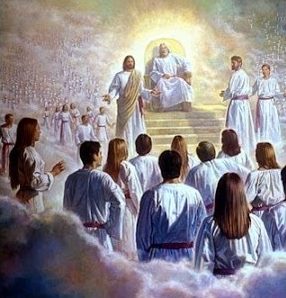 With axe-grinding: Steve Hays.
With axe-grinding: Steve Hays.
In v36, Jesus uses “son of God” as a synonym for “God” in v33. They accuse him of making himself “God”. Yet, in v36, he translates their allegation as equivalent to the accusation that he’s the “Son of God”. So he himself uses “God” and “Son of God” as interchangeable labels in that context.
That wouldn’t make a lot of sense, would it, using “Son of God” to mean “God”?
Without axe-grinding: Roman Montero.
No he doesn’t use “Son of God” as a synonym for “God”, he uses it to mean “son of God”. “Son of God” is never used in any Jewish literature to refer to YHWH. It is used to refer to Kings and to lesser Deities (later understood as angels). So their charge was either completely confused (which would make sense for John’s portrayal of the Jewish enemies of Jesus, they were often confused) or they thought calling oneself a “son of God” in the sense of a lesser deity was blasphemy.
Unlike many a latter-day reader, John never confuses together God and his Son.
No one has ever seen God. It is the only Son, who is close to the Father’s heart, who has made him known. (John 1:18, NRSV, alternate translation)
One was seen, in the ordinary way, while the other was not. (1 John 1:1-3)
My analysis of Jesus’s argument is here.
Update: In Hay’s mind, people only “attempt” to reply to his convincing diatribes. He replies here.
Roman comes back here. In part,
…messiah means “anointed one” and the assumption is that he is anointed by God, to do God’s will. God doesn’t need to be anointed by anyone. Also there is no precedent on Judaism for a messiah who is Yahweh himself.
…The most quoted scriptures in relation to Christ in the NT are psalms 110:1 where Jesus is the non-Yahweh “lord”, and Daniel 7:13-14 where Jesus is the non-Yahweh “son of man”. Both those scriptures, used countless of times for Christ, exclude the possibility of him being Yahweh.
Those are obvious, and obviously salient facts about the texts.
Hays delivers his typical off-the-cuff, over-long, and over-aggressive reply here. In part,
Montero doesn’t bother to explain how Dan 7 excludes the possibility that messiah is Yahweh.
 Gee, let’s see if that needs explaining. In the scene, Yahweh is the one on the throne. Then a one like a son of a man (so, not Yahweh) comes to Yahweh, and is given “authority, glory and sovereign power.” (Daniel 7:14) The reader is to understand that this couldn’t be Yahweh, since he already has those things, and could not lack them, given that there is a creation to be sovereign and authoritative over!
Gee, let’s see if that needs explaining. In the scene, Yahweh is the one on the throne. Then a one like a son of a man (so, not Yahweh) comes to Yahweh, and is given “authority, glory and sovereign power.” (Daniel 7:14) The reader is to understand that this couldn’t be Yahweh, since he already has those things, and could not lack them, given that there is a creation to be sovereign and authoritative over! What you have to realize about him is that he’ll affirm or deny seemingly anything in order to defend his confused, pet speculations about Jesus and God, which he assumes to be orthodox. He simply demands that any text be read as consistent with these. So he affirms that Jesus and God are numerically one, and yet grants that they differ. So he simply denies that it is impossible for a single being to be and not be the same way at the same time – which is about as ridiculous as a claim can be. He’s as it were jumped the theological shark. And when this is pointed out, he’ll just abuse and stomp up an ineffectual cloud of philosophical dust. But he’s unable to avail himself of the various Christian philosophers’ solutions. In his mind, his view is simply proof-textable, and the longer you go on being unimpressed by his exegesis and arguments, the more it shows that you’re just a stupid, incompetent jerk. He’s got a bad case of the old odium theologicum.
What you have to realize about him is that he’ll affirm or deny seemingly anything in order to defend his confused, pet speculations about Jesus and God, which he assumes to be orthodox. He simply demands that any text be read as consistent with these. So he affirms that Jesus and God are numerically one, and yet grants that they differ. So he simply denies that it is impossible for a single being to be and not be the same way at the same time – which is about as ridiculous as a claim can be. He’s as it were jumped the theological shark. And when this is pointed out, he’ll just abuse and stomp up an ineffectual cloud of philosophical dust. But he’s unable to avail himself of the various Christian philosophers’ solutions. In his mind, his view is simply proof-textable, and the longer you go on being unimpressed by his exegesis and arguments, the more it shows that you’re just a stupid, incompetent jerk. He’s got a bad case of the old odium theologicum.
If you’re following here is Steven Hay’s reply:
https://triablogue.blogspot.no/2017/06/i-and-father-are-one.html
And here is mine:
https://theologyandjustice.wordpress.com/2017/06/17/but-what-does-it-mean-and-whats-the-response/
It continues (for better or for worse)
http://triablogue.blogspot.no/2017/06/on-god-gods-and-gods-son.html?m=1
https://theologyandjustice.wordpress.com/2017/06/19/what-on-earth-is-jesus-saying-in-john-1034-36/
In the end, when he finally actually gives a reading of John 10:34-36, it ends up being so adhoc and eisegetical that it can hardly be called a reading at all.
Good points in the article.
However, I wouldn’t concede to Hays that “sent into the world implies the preexistence of the son” since the writer of the 4th Gospel had already indicated that Jesus was “coming into the world” during the time of John’s baptism (John 1:9; John 12:46).
Moreover, Jesus indicated that he was “sent into the world” in the same sense that his disciples had been “sent into the word” (John 17:18). Nobody infers “the preexistence of the apostles” because they are said to be “sent into the world” like Jesus.
Comments are closed.